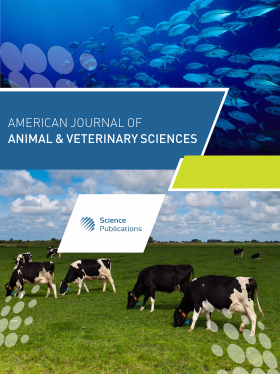Detection of Staphylococcus pseudintermedius in Dogs and Cats in Selangor, Malaysia
- 1 Universiti Putra Malaysia, Malaysia
- 2 Universiti Malaysia Kelantan, Malaysia
Abstract
Staphylococcus pseudintermedius is an emerging coagulase gram-positive staphylococci in dogs and cats. It has now become a threat to animal health due to its multidrug resistance leading to very limited therapeutic options particularly in the treatment of small animals and therefore, requires urgent action to control its spread. The organism is currently recognised as a significant pathogen in veterinary medicine causing skin, ear and wound infections in dogs and cats. So far, there is limited coverage in relation to research studies concerning on S. pseudintermedius in dogs and cats in Malaysia. Therefore, this study was conducted to determine the presence of S. pseudintermedius in dogs and cats as well as to evaluate the best site for isolation of the organism. A total of two hundred dogs (n = 100) and cats (n = 100) were randomly sampled. Swab samples were taken from the nasal cavity, buccal cavity, rectum and perineal skin aseptically from both pet and stray dogs and cats. The samples were cultured and isolates were identified by biochemical tests and confirmed using a species-specific PCR assay. Our results revealed that the proportion of detection of S. pseudintermedius was higher in stray dogs and cats than pet animals. Staphylococcus pseudintermedius was detected in 6.5% (13/200) stray dogs, 6% (12/200) stray cats, 1.5% (3/200) pet dogs and 0% in pet cats. Our findings also demonstrated that nasal cavity was the ideal site for isolation of the organism (5.5%), followed by buccal cavity (3.5%), skin (2.5%) and rectum (2.5%), but statistically, the difference was not significant (p = 0.174). In conclusion, this study provided an empirical evidence in relation to the detection of S. pseudintermedius in stray and pet dogs and cats in Selangor, Malaysia. Future research is urgently needed to better understand the epidemiology of S. pseudintermedius in field settings.
DOI: https://doi.org/10.3844/ajavsp.2020.10.14

- 6,344 Views
- 4,327 Downloads
- 6 Citations
Download
Keywords
- Staphylococcus pseudintermedius
- Prevalence
- Dogs
- Cats
- Malaysia
